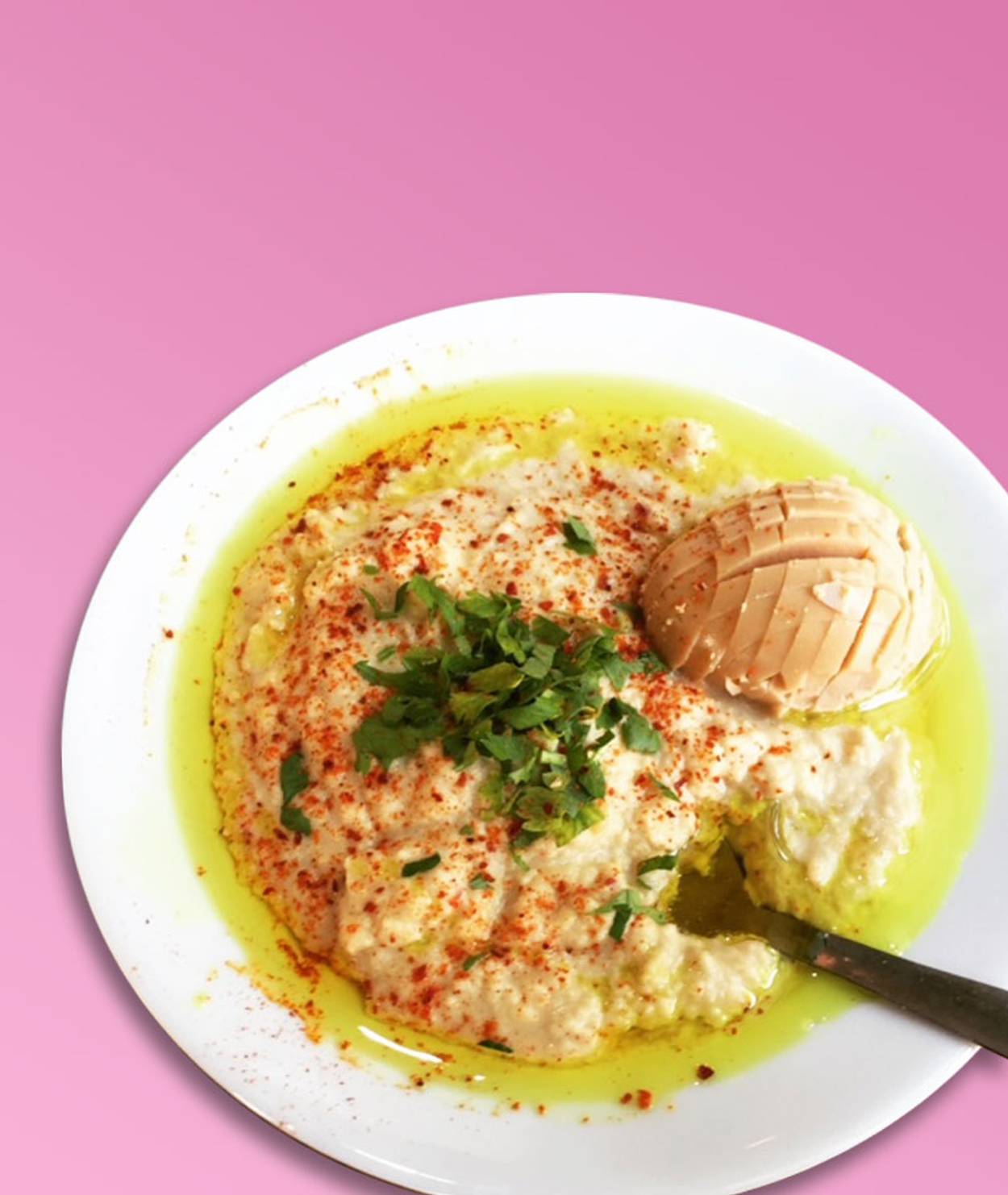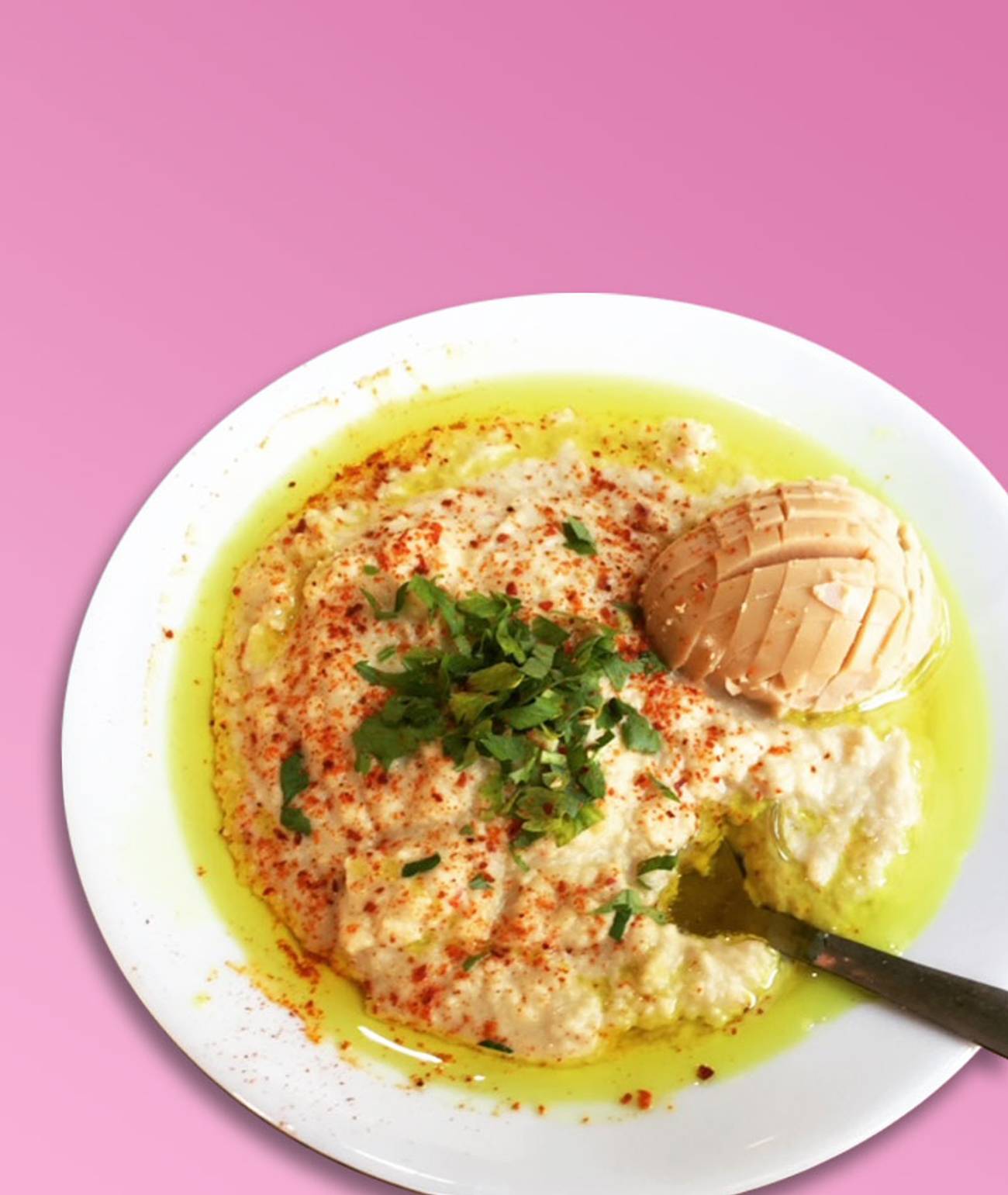Holding on to His Hummus
As my father’s health deteriorated, I hoarded containers of his garlicky specialty in my refrigerator—hoping it might keep him, and our connection, alive




My dad was known for his hummus. Even among all the chefs in the family, some with established restaurants, Shaul’s dish was just a bit more famous than the others. No matter what else we were eating as a family, a couple of dishes of his hummus would be scattered on our table.
My dad has always been a chef. Not the type who went to culinary school, or any formal school for that matter, but the type who grew up in the kitchen in Israel watching his Syrian mother cook three meals a day for her seven children. He was the oldest, so he always got the first taste.
There’s no recipe for his hummus. Every so often I’d tell my dad that I wanted to learn how to make it. “No recipe,” he’d reply. “Come watch.”
There were no measuring cups, no prescribed amounts of any ingredients, making his delicacy that much harder to perfect. There were just pinches and tastes. And lots and lots of garlic.
Growing up, I definitely enjoyed eating the traditional Israeli food my parents cooked, but its presence was so prominent that I almost got sick of it. I’d have hummus sandwiches for lunch in elementary school, and I’d smell like garlic when friends would come pick me up in high school. I wasn’t like everyone else, and that hummus was always there to remind me of that.
At home, we called it chummus (chuuu-moos), with the emphasis on the chuuu, but in public, I’d pronounce it the American way: hum-mus. But I never tried that ordinary, American hummus: I didn’t even know they made store-bought hummus until I got to college and my roommate offered me some with pretzels as a snack.
In September 2015 my father was diagnosed with stage 3 lung cancer, which felt like a sucker punch. Nonetheless, he was somehow able to muster the strength to stand, sometimes slumped over, in the kitchen and whip up his creamy, savory, very garlicky hummus. Even when he himself had no appetite, and the chemotherapy wore him down, he made it because it was his thing. Each time I went to my parents’ home in Brooklyn, they’d send my husband and me back with a bag of goodies that always included a plastic container of Dad’s hummus.
Once the diagnosis came, I promised myself I’d sit down with my dad and learn exactly how to make his hummus. I envisioned us cooking together in his kitchen as my mom recorded on my iPhone. I’d watch his hands, and capture the details that made his dish so mysteriously satisfying. The hummus I wished away when I was younger had now become my most prized possession.
Judaism gives us so many rituals to follow once someone dies. It teaches us what to do in the final moments of death, and afterward. We know what to wear, what to say, and how to act. We have clear rules for the first seven days, first 30 days, and even the entire first year after death. We even have specific prayers to say as someone is dying.
But what about the before? What do we do before someone dies? What do you do when you know your loved one is dying? What about that dreadful, yet precious time in between life as we know it, and death?
What do you do when you know your loved one is dying? What about that dreadful, yet precious time in between life as we know it, and death?
I knew my father was dying for over four years. Some would say I was lucky because I could savor this time, even though we didn’t know when our time together would be up. But I didn’t know what to do with this time between. There were no rituals to follow, and no traditions to guide me. So I was left to create my own.
There were the practical rituals I created, like sending ceremonial-grade matcha tea to my father’s house every week, with the hope that its cancer-fighting properties would keep him alive longer. Then there were crystals on my nightstand, hamsa bracelets on my wrist, and lots of knocking on wood, too. As I accompanied my father to every appointment he had, I would walk right foot first into Memorial Sloan Kettering. I even created a ritual of purposely not answering my father’s phone calls, so he’d leave a voicemail that I could save, and listen to over and over again as he was sick, and long after he was gone.

The ritual I created, and clung to most, was hoarding containers of my father’s homemade hummus. Whenever he would make a new batch, I would go to our fridge and replace the old container with the new one. Sometimes we’d eat it, and sometimes I’d just leave it on the shelf, tucking it away until a new one would arrive. I did this over and over again, for over four years.
Food had always been a huge part of my relationship with my father. It connected me to him, to my Sephardic background, and to our memories as a family, before cancer. Every time I would open my refrigerator door, it would comfort me to see his hummus there. I would think of my father, his strength, and our connection, and I’d hope that it wouldn’t be the last batch I’d get to hide in our fridge.
The cancer progressed, and as my dad began to shrink, I began to grow a new life. I was six months pregnant, my heaviest weight ever, and it hurt me to see his shriveling body next to mine, as I expanded by the day. He weighed 134 pounds, shedding 40 that he didn’t need to lose in just one year. We weren’t sure if it was from the chemotherapy, or the cancer. It was probably both. Throughout the pregnancy, we spoke daily, and the first thing we asked each other was “Did you eat?” Each of us was concerned the other wasn’t eating enough.
I bought him protein bites, sent him snack recipes, and schlepped oils, avocados, and other fattening foods to their house, begging him to eat them. He taught me how to cook salmon because it was good for the baby’s brain, and stuffed bags of almonds in my purse so my blood sugar didn’t drop too low. We were both nauseated: me, because I was growing life, him, because he was holding on.
Sometimes he’d show up at our apartment, slumped over and gasping for air, carrying a plastic bag with a container of his hummus. He was trying to keep me healthy, and I was trying to keep him alive. During one visit, he brought his food processor, the device used to make his hummus. “It’s for you,” he said. I knew the end was near.
As the long, harrowing battle with cancer continued, and we moved to the dreaded stage 4, I replaced the hummus containers less often. He’d been through multiple rounds of chemotherapy, radiation, immunotherapy, and surgeries. His energy was wearing down. I knew that day was approaching that I’d have to watch and learn exactly how to make the hummus I cherished, but that would mean it was the end, and I couldn’t bear the thought.
Every time I would open my refrigerator door, it would comfort me to see his hummus there.
I gave birth to my father’s first granddaughter. He admitted to me that he wanted it to be a boy, but after my mom wheeled him into the recovery room and he caught a glimpse of her, he was smitten.
Within months, he shed another 20 pounds. Slowly, the focus shifted from him eating the right foods to just eating any foods. Soft foods, they said. Fattening foods. “He has to put on some weight to continue treatment,” his doctors told us. I’d bring him stews, soups, and sweet potatoes. Too weak to bring the spoon up to his mouth, I’d sit and feed him my latest healing concoctions. I even attempted to make his hummus myself. “More garlic,” he whispered, as he shook his head. “You’ll have to teach me,” I said.
I suppose I could have frozen the containers of his hummus that sat in my fridge—eventually going bad—but I never did. Having his hummus be physically present in our refrigerator at all times would bring me a temporary sense of calm during the tumultuous rollercoaster ride that is cancer. I didn’t mean to keep rotting food in my fridge, but it became my ritual. He’d overcome everything this merciless disease put in front of him. I started to think that maybe hoarding his food had something to do with my dad still being alive.
I was afraid to let go, and somehow convinced myself that this ritual of hiding old containers in the back of my fridge may have kept him alive long past his life expectancy, and would be there to remind me of him once he was gone.
The thing is, I never told anyone about this ritual. Not even my husband, who would occasionally ask if I smelled something weird in the fridge, and I’d just shrug him off. Sometimes I think he knew what I was up to, and sometimes I worried he would call me crazy for storing old plastic containers of homemade hummus for over four years. I dreaded the day he might discover my secret, when I’d have to yell, “Don’t throw out the hummus!” as he held the moldy mush over the garbage can.
On the morning of my father’s funeral, I emptied our refrigerator so that nothing would be left to go bad during our seven-day stay at my mother’s house for the mourning period of shiva. I glanced over at the moldy container of hummus in the back. It stood alone on a shelf. I couldn’t remember how long it had been there. On the shelf below sat two brand new jars of chickpeas. I bought them the day before, just before he died, intending to have him teach me how to make the hummus that weekend. We were bringing my father home from hospice, so this was my final chance to learn the no-recipe recipe. But I’d never get to. If only I had asked him sooner.
A couple of months after my father’s death, I left the apartment for the day and kindly asked our cleaning person to empty the fridge. “This time, please clear out everything,” I asked. I didn’t have to say more, she knew what I was asking. I couldn’t bear to throw out the hummus myself, saying goodbye to a ritual I’d come to rely on.
It’s been over 18 months since my dad died. His food processor is still tucked away in our pantry. I’ve recreated his Israeli salad recipe, and make his ijeh (Syrian fried meat patties) for my daughter weekly, but can’t yet bring myself to recreate his hummus.
We do eat hummus every year on his birthday, ordering from the only place that my father said came close to his. And every Friday, my daughter and I head to the supermarket to buy hummus, and together we say, “Saba’s was the best.” I know that one day, I will recreate the tradition of making his hummus for my family. But for now, these are our new rituals.
Jamie Betesh Carter is a researcher, writer, and mother living in Brooklyn.